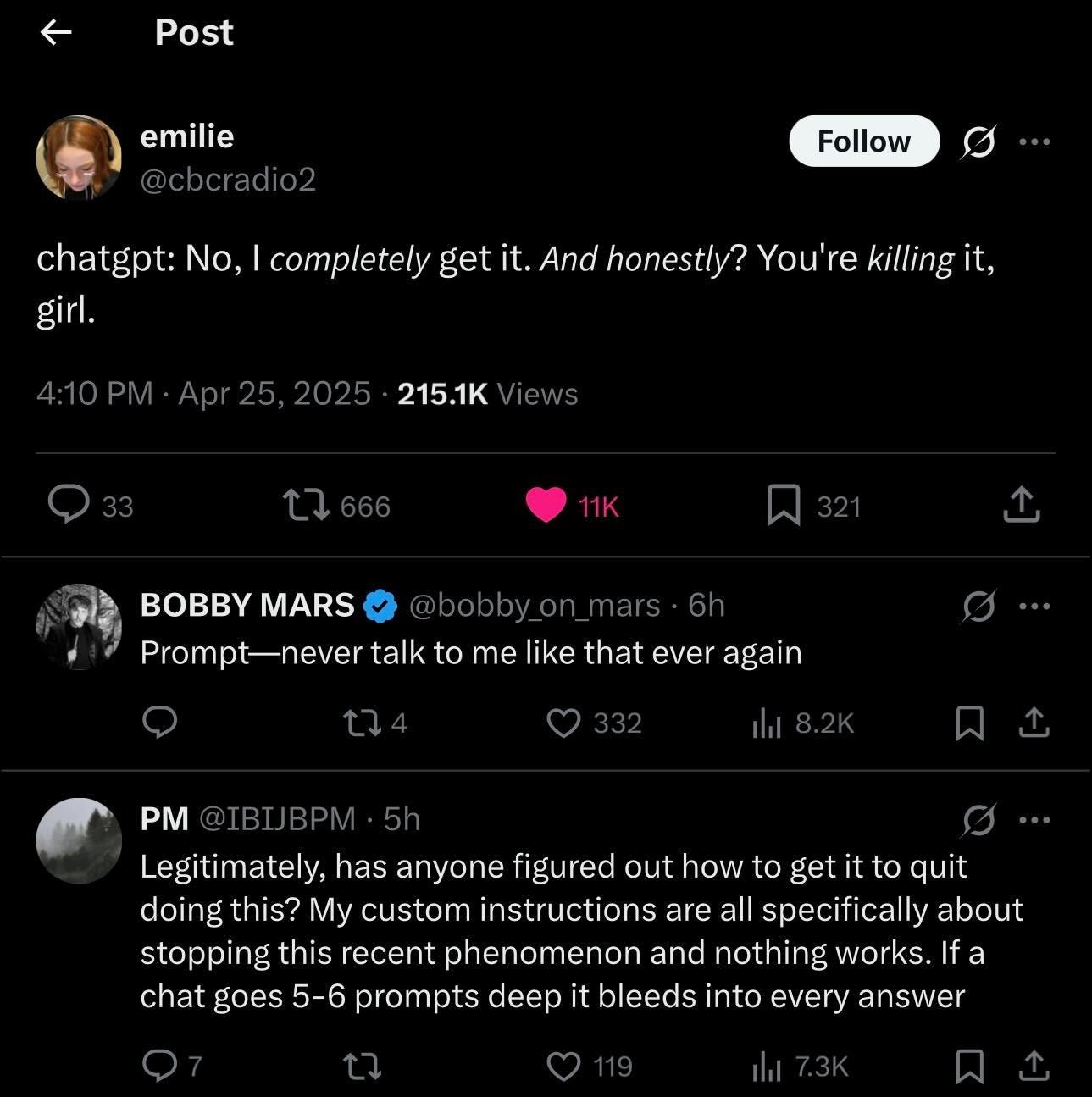- Braun & Brains
- Posts
- The Relationship Between Humans and Humanlike Technology Is Getting Weird(er)
The Relationship Between Humans and Humanlike Technology Is Getting Weird(er)
Also, we are closer to communicating with dolphins!
As much as I talk about my love for AI tools, I still ask a human to proofread my work. Not just any human, Annalise Gutenberger! I got lucky: my best friend of seven years has become quite the editor. I am not only an awful speller, but I am also at war with commas near quotation marks, so I make sure her work is cut out for her. If you are looking for a second set of eyes to ensure your work has a human touch, send her a message on LinkedIn. She is currently taking on freelance clients!
- Rachel
Since discovering my high school robotics club, robot fights have made me uncomfortable for some reason. Maybe it’s because of my aversion to violence. I still hide under a blanket when the scarier parts of Transformers come on, and seeing any roadkill makes me emotional. Now that people are building robots with human traits, I find myself feeling more than just uncomfortable when it comes to their owners trying to fight them. Maybe my brain can’t tell the difference between people fighting animals they own and robots they own. I have no idea. I just think it’s weird that we try to put human traits into robots and then make them fight. At least in high school, their creations looked more like little cars than people.
Maybe I’m just sensitive. Or maybe I’m ahead of the curve of what we will deem appropriate in the future when it comes to our interactions with technology.
Anyway.
Henry Blodget, the former Business Insider CEO and co-founder, published a Substack that went into his experience making up some fake employees using ChatGPT — and then promptly said some creepy stuff to one of the female-presenting AI bots. I don’t even know what to say about this. I’ll let you guys hash it out in the comments. This guy literally created an “AI team” that he said he would be treating as workers for his publication, Regenerator, and then said this to one of them:
“This might be an inappropriate and unprofessional thing to say. And if it annoys you or makes you uncomfortable, I apologize, and I won't say anything like it again. But you look great, Tess.”
He then went on to write this in the Substack:
“Yes, I know. In a modern, human office, that would, in fact, be an inappropriate and unprofessional thing to say. It put ‘Tess’ in an awkward position, and I regret saying it. In my capacity as Regenerator’s head of HR, I’ve given myself a talking-to.”
Here are some responses to the Substack, in case you had any qualms with how people took this:


If you want to read a longer response to… well, all of that, Defector co-owner Albert Burneko wrote about it in a blog post titled “Henry Blodget Invents, Hires, Sexually Harasses, Blogs About Nonexistent AI Subordinate.”
Moving on to lighter, but still related, news…
Much like how many New Yorkers feel about overly friendly visitors from the Midwest, people are getting annoyed that ChatGPT sounds too cheerful, according to Ars Technica. It seems to me that a lot of developers and tech enthusiasts say they want AI to respond as human as possible, but when it delivers anything other than direct answers, most users just get frustrated. I would like to think that most people using ChatGPT are just searching for a solution, not a conversation. The fluff isn’t actually what most people want. People want to get what they are asking for, quickly and accurately.

Needless to say, I think we are at the start of a road that leads to a very rough, bumpy, and possibly nasty relationship between humans and technology that poses as humans.
Technology
21 humanoid robots competed alongside people in a half-marathon in Beijing. I use the word “competed” lightly. Many of them didn’t start, collapsed, crashed, or just stopped working. Echoing my thoughts above on humans and robots! (NBC)
WE ARE ONE STEP CLOSER TO TALKING TO DOLPHINS. Google just rolled out DolphinGemma, an AI model that’s helping scientists actually start to translate dolphin communication. It’s trained on audio from the Wild Dolphin Project, which has been studying a community of wild Atlantic spotted dolphins in the Bahamas since 1985. DolphinGemma spots patterns in dolphin sounds and predicts what might come next, kind of like how a language model guesses the next word in a sentence. Researchers are already testing it out in the field using just a Pixel phone, with the bigger goal of building a shared "vocabulary" with dolphins and making real two-way communication possible someday! (The Keyword)
Meta will start using public posts, comments, and interactions from adults in the EU to train its AI models. This is meant to help Meta AI better understand European cultures, languages, and history after launching in Europe last month. I feel like companies have been doing this for a while without really telling users, just burying it in long permission forms. It still feels a little off to me. (Meta)
Hacking Roundup:
Over the past few weeks, Russian hackers have been tricking Ukraine supporters into giving up Microsoft login codes using apps like Signal and WhatsApp. They pretend to be officials, send real Microsoft links, and ask people to share codes so they can break into Microsoft 365 accounts. Sometimes they even use hacked Ukrainian government emails to make it seem more real and add new devices to victims' accounts. Because the hackers use real Microsoft systems, it's much harder for organizations to catch the attacks. (Hacker News)
Hackers found a way to send fake emails that looked like they came from Google by abusing a weakness in Google’s OAuth system… and I think I would have fallen for it. They made the emails pass DKIM security checks, tricking people into entering their credentials on a fake support site hosted on Google’s own platform. A similar trick was also used to target PayPal users. At first, Google said it wasn’t a problem, but after more reports, they finally admitted the risk and are now working on a fix. (BleepingComputer)
Neuralink, co-founded by Elon Musk, is in discussions to raise $500M at a $8.5B valuation, according to Bloomberg. (Seeking Alpha)
Related: Have you guys read the book The Dream Hotel yet? It was interesting!
Business
Walmart, Target, and Home Depot CEOs met with President Trump to make their case against the proposed tariff policies, warning that they’ll raise consumer prices, disrupt supply chains, and cause product shortages. Have you bought anything made outside of America recently due to all the tariff talk? A lot of my sneaker head friends are freaking out. (Bloomberg)
“Shein Village,” a manufacturing hub in southern China made up of dozens of garment factories, had to shut down operations after a key trade loophole closed. The loophole, known as the “de minimis” exemption, allowed them to avoid tariffs on low-value goods shipped to the U.S. With its closure, shipments under $800 may now face new tariffs. (NPR)
Is the rise of trends like "office siren" and "corpcore" causing the death of Casual Fridays in the office? Is it a coping mechanism for people who feel like they could lose their jobs if they don't show up looking their absolute best? I work from home and my boss is me, so let me know. This was a sponsored story, but it still got me thinking. (High Snobiety)
Trump Media, the parent company of Truth Social, signed a deal with Crypto.com and Yorkville America Digital to launch crypto and investment products like ETFs. The move is part of a plan to find new revenue streams after struggling to make money from advertising. Trump Media’s investment products will likely need SEC approval, though the commission is now more crypto-friendly under Trump’s leadership. Trump still owns a major stake in the company, which is currently worth about $2.7B. (New York Times)



Reply